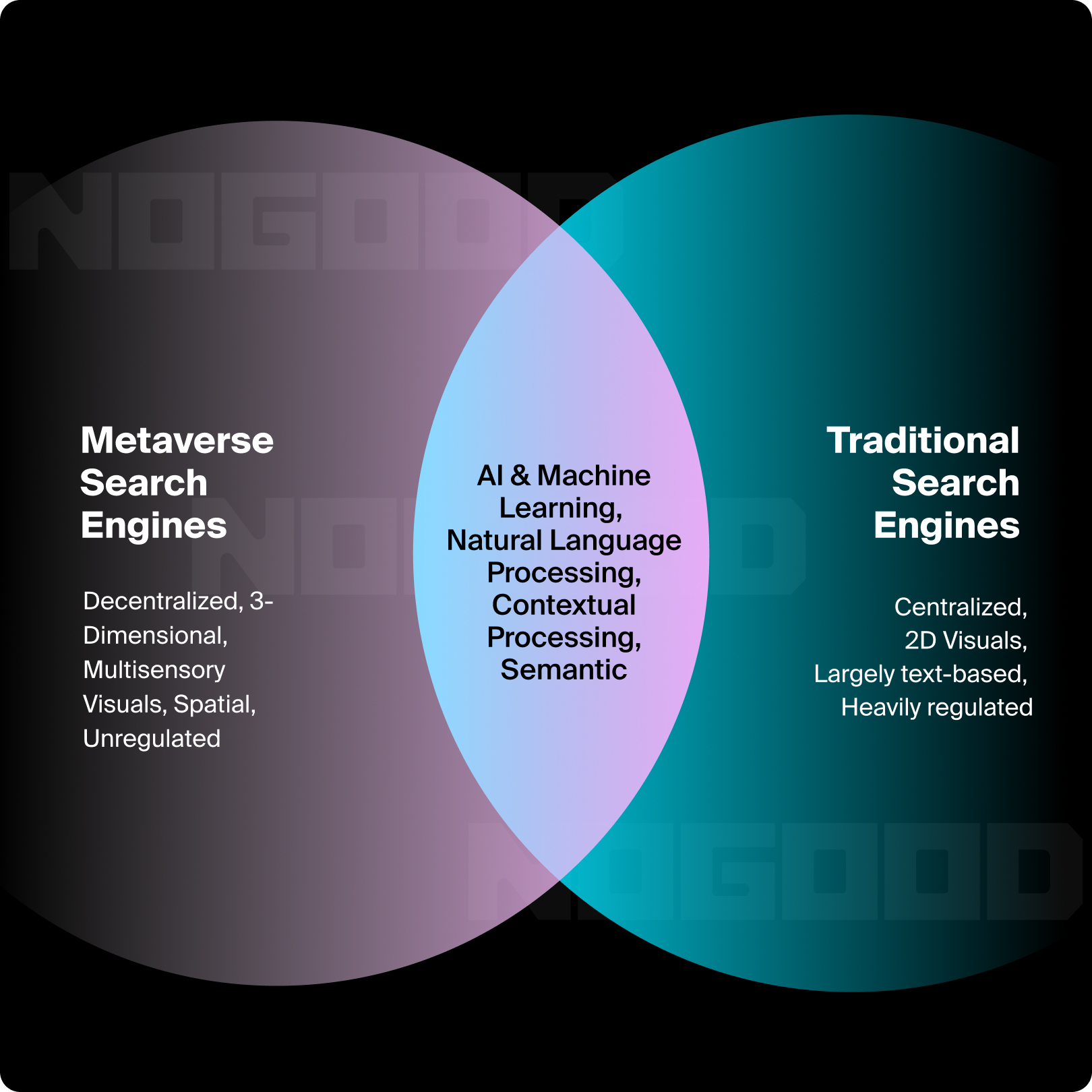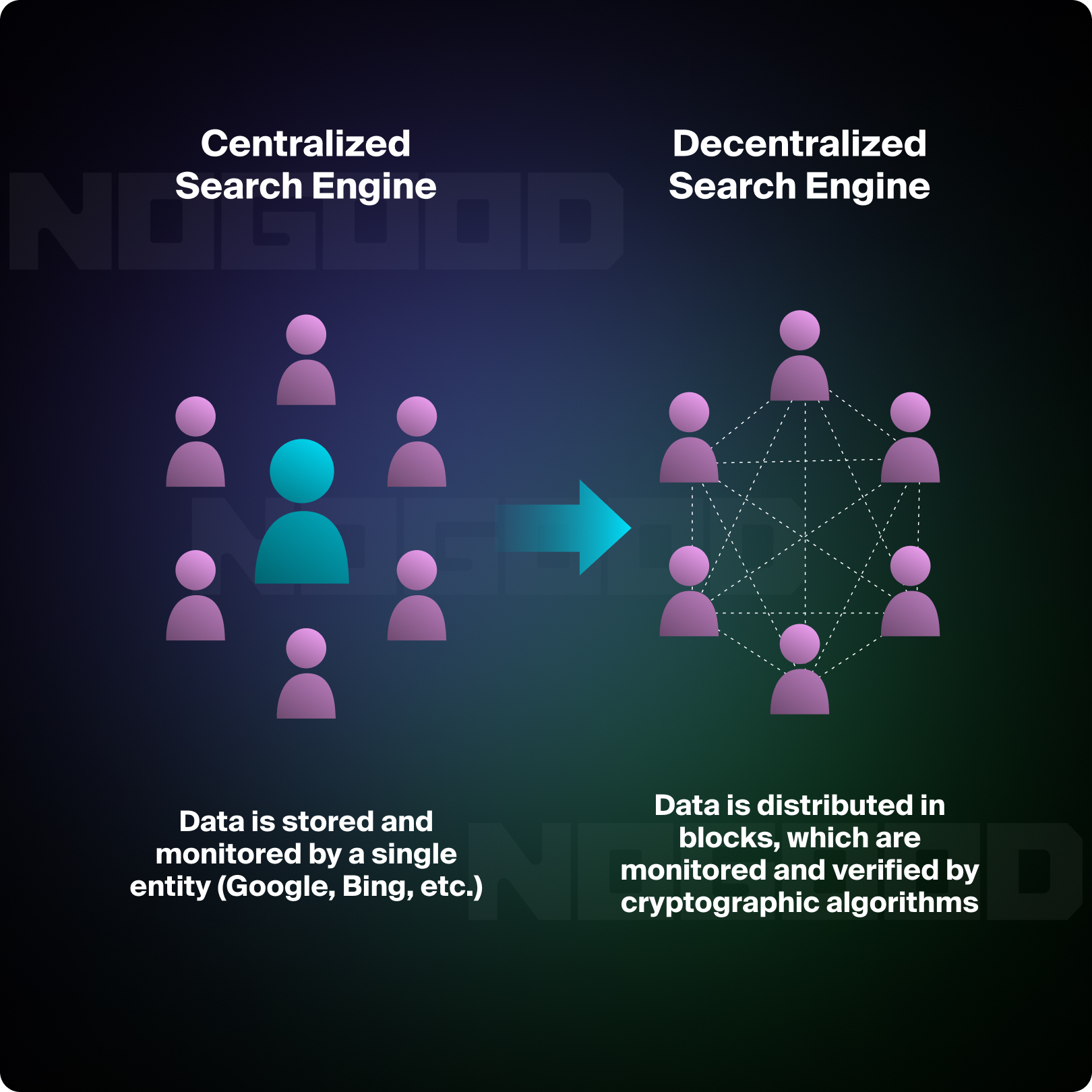Imagine a virtual space where you can take a tour of a house you plan to buy, attend a concert, play a video game with your friends, or even collaborate with coworkers on a project. That space is the metaverse…with a search engine for navigation.
When the Metaverse was first introduced, it was an immersive 3D space for users to interact and play their favorite video games. It has since been revolutionized to help developers and engineers push the limits of what’s possible to create.
The Metaverse allows people across the world to collaborate and connect virtually by seamlessly sharing data. Metaverse technologies are creating a web of interconnectivity that goes far beyond collaborating with your team on a Google Sheet, or presenting a deck over Zoom.
Artificial intelligence is making it possible for users to access places they’ve never been and combine them to create something that has never existed before. Engineers are now using the metaverse to create 3D models of cars, buildings, and robots before constructing them in the physical world. These simulations help the engineers understand how the product will work and the factors that will affect it before investing time and resources into building it.
With this vast digital space comes the need for navigation. Metaverse users need a way to jump between virtual spaces, comb through subsets of data, and find and generate 3D images – all complex actions that require more than a simple Google search.
Prepare for the future of search navigation
Search Navigation in the Metaverse

Any Google search will conjure up a few types of results: AI summaries, websites, images, videos, local packs, and ads.
In the metaverse, search results are much more complex.
Since many elements in the Metaverse are 3-dimensional, search engines need to be a bit more dynamic to support spatial and contextual searches. That’s why Nvidia created DeepSearch, an innovative navigation system that allows users to find complex data in the metaverse based on text or 2D image searches.
DeepSearch uses natural language processing to search through massive amounts of data and presents you with a curated list of thumbnails for places you’ve never been or seen. You can filter through results based on factors like mood, tone, and landscape, and AI will find the perfect match.
Developers can take this a step further and take these hyper-curated results and combine them to create something that has never existed before. Nvidia’s metaverse technology is the framework for developers to fabricate virtual and augmented realities that users can actually visit.
At its current stage, DeepSearch makes it possible for developers to create 3D spaces with AI; but as the metaverse expands, navigation systems like DeepSearch will make it possible for users to interact with the metaverse as well.
Creating a Decentralized Search System

Decentralization in the metaverse means there’s no single entity (like Google) monitoring and storing all the data. This means users will have more privacy and control over how their data is used and who has access to it.
Decentralization is made possible through blockchain technology. Similar to how the blockchain stores cryptocurrency transactions, the metaverse can use the blockchain to store user data through cryptography techniques.
Cryptocurrency, a blockchain technology, offers a secure way for users to buy, sell, and trade virtual assets in the metaverse. Much like each country’s currency is the backbone of its society, everything in the metaverse will rely on cryptocurrency.
The blockchain sets the framework for users to exist in the metaverse, this technology is the basis for how users will find and share information. This decentralized technology removes limitations for what users will be able to create in the metaverse.
Why the Blockchain Matters for Metaverse Search Engines
Decentralized data is more discoverable by AI. When information is stored on the blockchain, AI can draw from both individuals and organizations, creating a much larger pool of data that goes far beyond the data available from a centralized database.
Blockchains maintain the integrity of the data because it is nearly impossible to hack them. Each block in the chain is “hashed” meaning the data is scrambled and cannot be reverse engineered and decoded. Because the data is not being stored in a centralized location, there is no single point of weakness in the chain’s security.
If the metaverse were to universally adopt this cryptographic technology, it would be an extremely secure way for users to find information, buy and sell digital assets, and interact with each other online. Users would also gain access to a wider database of information than traditional search engines provide.
How to Optimize for Metaverse Search
User Experience
Since the metaverse is an immersive space, where users can physically exist and interact, user experience will become even more important. As the metaverse becomes more widespread, users will be spending more time interacting with the space. If metaverse content isn’t accessible and easy to use, users will gravitate toward content that is.
How Marketers Can Prepare
- Create content tailored to the user’s search intent so users can easily find exactly what they’re looking for.
- Employ responsive design elements to ensure your content displays seamlessly across all devices and digital spaces.
- Optimize your file sizes and types to make sure your content loads as quickly as possible.
- Include interactive elements for improved engagement. For example, implement interactive 3D models that users can explore or manipulate.
Visual Elements
We all know the metaverse is all about using visual elements to create immersive experiences. In order for developers to create these multisensory visuals, they use Universal Scene Description (USD) files. As the name suggests, USD files can be shared without the need to change the file type. This universal file can be used on any platform or space so developers can work collaboratively and easily share and transfer their work.
As the metaverse expands, we can expect this file system to develop, making it easy for users to share content between different virtual platforms.
The metaverse has a large database of visual elements that artists and developers can use AI to search through. Elements can be filtered by nuanced characteristics like mood, tone, and landscape to find the ideal match. Developers can then mix and match elements to create a completely new visual element or AR space.
How Marketers Can Prepare
- Familiarize yourself with USD (Universal Scene Description) files, as this system is the basis for all visual elements in the metaverse.
- Implement structured data so search engines can better understand your visuals.
- Gamify key elements to make your content more interactive and entertaining for users.
User Engagement
Multisensory environments like AR and VR will have different engagement metrics than content in traditional search engines. Because the metaverse is largely rooted in visual elements, marketers will need to analyze how users physically interact with the 3D space.
Here are some potential ways to track engagement in Metaverse search engines:
- Locations: Spaces users visit and what they do there
- Objects: How users pick up and move them around
- User interactions: Speaking, playing a game, changing locations
- Time spent: How long users stay in a location or interact with other users
- Exchange of digital assets: Buying, selling, and trading through cryptocurrency
How Marketers Can Prepare
- Heatmaps paint a detailed picture of how users interact with your content.
- AR and VR may use heatmaps to determine user touchpoints and track engagement.
Contextual Search
Metaverse search engines have LLMs that use natural language processing to better understand the user’s query and deliver more relevant results.
Natural language processing allows the LLM to search through large subsets of data to find curated results. Contextual search takes into account the user’s intent in order to find the best match. A great example of metaverse contextual search is visual effects company ILM. The creative team uses Nvidia’s DeepSearch to help them create scenes for movies and TV.
The production designers use conversational language to search through Nvidia’s database to find landscapes that perfectly match the emotional tone of the scene. Designers can then browse different backgrounds and skies as if they were actually on location, choosing the one that captures the exact tone.
How Marketers Can Prepare
- Add semantically related keywords to help search engines relate your content to similar queries within the same topic. It’s important to note that traditional semantically related keywords don’t capture the essence of the metaverse. Consider the following:
- Platform-specific: Tailor your keywords based on the specific platform prevalent in the metaverse (you’re optimizing for), in order to enhance content relevancy.
- Metaverse terminology: Ensure that the terminology you’re using resonates with users navigating virtual environments. There are various unique terminology associated specifically with the metaverse.
- Add relevant internal links to create relationships between your content.
- Internal linking strategies in the metaverse differ from traditional SEO. For example, you can have the following types of internal linking strategies in the metaverse:
- Interactive portals: Allow users to interact with your portals physically by using these portals as links between spaces to improve the UX.
- Holographic hotspots: Allow your users to interact with specific areas by integrating holographic hotspots within the virtual environment, which will trigger relevant information and links.
- Add structured data to help search engines better understand what your content is about.
- Optimize your header tags to provide additional context for each section of your content.
Spatial Search
Search results in the metaverse are a 3-dimensional immersive experience that users can physically interact with, meaning the way users search in the metaverse will be more dynamic than traditional 2D search. Metaverse search engines place more importance on searches that navigate the user to a specific digital space.
Let’s say a user wants to find a virtual concert to attend. A traditional search engine would provide the user with options for concert events, show dates and times, and options to purchase a ticket, as well as host the concert in a 2D virtual space.
In the metaverse, finding a virtual concert would require all the steps a traditional search engine would take, but it would also need to physically navigate the user to the virtual 3D space where the event would take place and provide the user with options for navigation within the virtual event.
How Marketers Can Prepare
- Optimize for location-based search by updating knowledge graph entities.
- Embed Google Maps and Geo-tags into your content.
- Include location-specific images with descriptive alt text.
- Include spatial keywords to provide context to spatially aware algorithms. For example, “virtual concerts in VR.”
- Including spatial navigation keywords is just as important as general spatial keywords; be sure to use keywords like “VR walkthrough” or “3D exploration.”
- Establishing a logical flow by designing a spatial hierarchy will help guide users through different experiences within the virtual environment. Ensure that your important elements are easily accessible to enhance user engagement.
Website Architecture
The metaverse makes search much more complex than traditional search because users need to be able to navigate 3D spaces and VR environments. Navigation in the metaverse is not as simple as doing a quick search and clicking one of the blue links on the first page of Google.
Because of this increased complexity, websites need to have an organized and logical website structure to make sure users end up at the intended page or virtual space.
How Marketers Can Prepare
- Every page on a website shouldn’t be more than four clicks from the homepage.
- Develop an internal linking structure to connect each page to one another and avoid orphan pages.
- Group pages by topic and arrange each topic into a different section on your website.
- Make sure all pages follow a logical hierarchy. For example, you start with a landing page then have sections of the topics you cover on your landing page. Then within those sections you have blog posts about each topic.
URL Structures
Since URLs are the physical address to pages on your website, it’s important to make sure it reflects the correct location on your website. In the metaverse, URL structure can help direct users to specific virtual locations such as games, chatrooms, events, and workspaces.
Optimized URLs not only help users navigate your site better, but they also help your pages rank higher on search engines by helping improve organic visibility.
How Marketers Can Prepare
- Optimize your slug with contextual and spatial keywords to signify a specific location in a virtual space.
- Implement canonical tags to differentiate similar pages and help users successfully navigate to the correct space.
- Use subfolders to establish logical content hierarchy and add keywords to your URL without appearing spammy.
Social Presence for Metaverse SEO
Integrating social sharing into Metaverse VR spaces helps foster community engagement and improves the organic visibility of your content. By connecting the metaverse with social platforms, brands can build trust by interacting with users in the spaces they are already engaging in. This could be VR games, live events, or streaming.
How Marketers Can Prepare
- Experiment with adding social backlinks to your content to encourage the connection between the web and social platforms
- Embed social sharing in interactive content so users can share their experiences and start discussions on social.
Safety and Privacy Risks of Metaverse Search Engines
Metaverse search engines make it possible to create, learn, and achieve more than traditional search engines do, all while giving users more control over their data. However, this technology doesn’t come at zero risk.
Because blockchain technology doesn’t require a single entity to be in control, the metaverse lacks regulations and a proper legal framework. As the metaverse evolves and users spend more time interacting with each other virtually, a lack of legal backing for the system could pose a risk to users’ safety and privacy.






